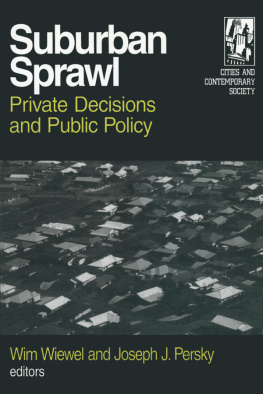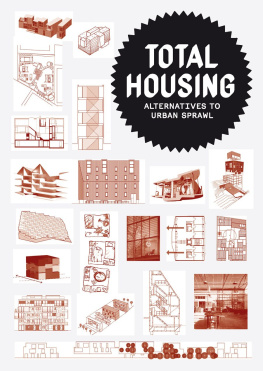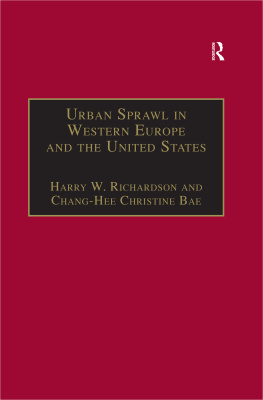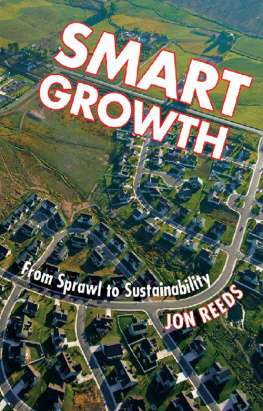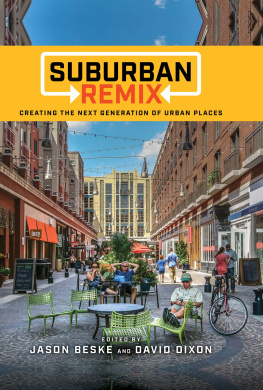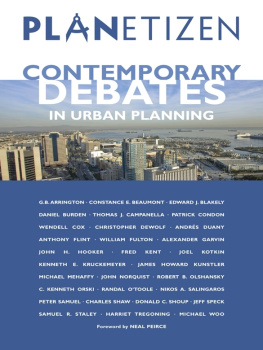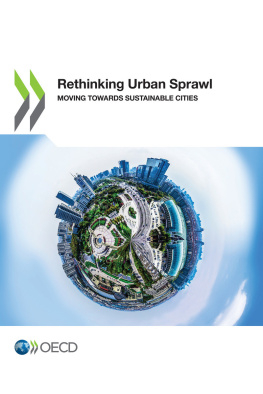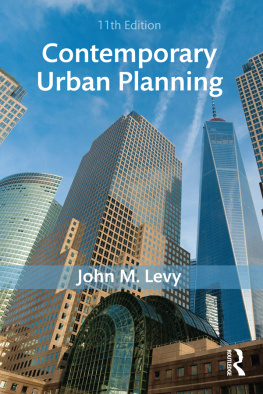Suburban
Sprawl
Cities and Contemporary Society
Series Editors: Richard D. Bingham and Larry C. Ledebur, Cleveland State University
Sponsored by
The Urban Center, Levin College of Urban Affairs Cleveland State University
This new series focuses on key topics and emerging trends in urban policy. Each volume is specially prepared for academic use, as well as for specialists in the field. The next title in the series is an edited volume by Dennis R. Judd, The Infrastructure of Play: Building the Tourist City in North America, a work about how tourism has transformed North American cities and the role of tourism in urban planning.
Suburban
Sprawl
Private Decisions
and Public Policy
Wim Wiewel and Joseph J. Persky
editors
First published 2002 by M.E. Sharpe
Published 2015 by Routledge
2 Park Square, Milton Park, Abingdon, Oxon OX14 4RN
711 Third Avenue, New York, NY 10017, USA
Routledge is an imprint of the Taylor & Francis Group, an informa business
Copyright 2002 Taylor & Francis. All rights reserved.
No part of this book may be reprinted or reproduced or utilised in any form or by any electronic, mechanical, or other means, now known or hereafter invented, including photocopying and recording, or in any information storage or retrieval system, without permission in writing from the publishers.
Notices
No responsibility is assumed by the publisher for any injury and/or damage to persons or property as a matter of products liability, negligence or otherwise, or from any use of operation of any methods, products, instructions or ideas contained in the material herein.
Practitioners and researchers must always rely on their own experience and knowledge in evaluating and using any information, methods, compounds, or experiments described herein. In using such information or methods they should be mindful of their own safety and the safety of others, including parties for whom they have a professional responsibility.
Product or corporate names may be trademarks or registered trademarks, and are used only for identification and explanation without intent to infringe.
Library of Congress Cataloging-in-Publication Data
Suburban sprawl : private decisions and public policy / edited by Wim Wiewel and Joseph J. Persky.
p. cm. (Cities and contemporary society)
Includes bibliographical references and index.
ISBN 0-7656-0967-3 (cloth: alk. paper) ISBN 0-7656-0968-1 (paper: alk. paper)
1. SuburbsIllinoisChicago Metropolitan Area. 2. Population densityIllinoisChicago Metropolitan Area. I. Wiewel, Wim. II. Persky, Joseph. III. Series.
HT352.U62 C47 2002
307.740977311dc21 |
2002066975 |
ISBN 13: 9780765609687 (pbk)
ISBN 13: 9780765609670 (hbk)
Contents
Joseph J. Persky and Wim Wiewel
Bonnie Lindstrom
Y.Q. Wang
Richard F. Dye and Therese J. McGuire
Jean M. Templeton
Joseph DiJohn
Piyushimita Thakuriah
Bonnie Lindstrom
Charles J. Orlebeke
John F. McDonald and Daniel P. McMillen
Daniel Felsenstein
Joseph J. Persky, Haydar Kurban, and Thomas W. Lester
Wim Wiewel and Kimberly Schaffer
Tables
Figures
The Brookings Institutions Center for Urban and Metropolitan Policy took the initiative for a nationwide set of case studies, of which this book represents the Chicago case. We thank Bruce Katz for his leadership role. We also thank Amy Liu for her consistent support and Janet Pack for her substantive comments. Researchers from other cities in the project also offered helpful insights. The John D. and Catherine T. Mac Arthur Foundation provided major funding; we are particularly grateful to Rebecca Riley, who has single-handedly done more to promote attention to these issues in Chicago than anyone else. At the University of Illinois at Chicago, the Great Cities Institute housed the project; David Perry, Lauri Alpern, and Denita Johnson all helped. All of the authors of the various chapters contributed ideas and comments on the work each of us was doing; thus, while the chapters have individual authors, they also represent a significant amount of collective work. Tingwei Zhang, whose project report was published elsewhere, provided invaluable assistance on Geographic Information Systems (GIS). Robert Bruegman continually challenged our assumptions and biases in a productive and collegial way; the result is better for his input.
The projects advisory committee similarly helped us stay on course; we thank Jerry Adelman, Rita Athas, Mary Sue Barrett, Scott Bernstein, Larry Christmas, Joanne Eckman, Jim Ford, Scott Goldstein, Jacques Gordon, Julie Hamos, Jesse Jackson Jr., Elmer Johnson, Rob Krebs, Howard Learner, Lynn Montei, Barack Obama, Aurie Pennick, Phil Peters, George Ranney, Rebecca Riley, Bill Syversen, and William Testa for their contributions. Doug Timmer and Kristen Kepnick each provided important assistance. Finally, in addition to being a coauthor on one of the chapters, Kimberly Schaffer played an invaluable role in keeping the entire project on track.
JOSEPH J. PERSKY AND WIM WIEWEL
Sprawl, or metropolitan deconcentration, has characterized Chicagos development virtually from the earliest days of the citys existence. While the term sprawl has only become popular in recent years, people and firms have long been moving out of the city to greener pastures (or cornfields) in search of more space, a healthier environment, or to get away from undesirable aspects of urban life. Indeed, the rate at which the urban land area expanded compared to the increase in population was probably greater in the 1920s than at any time before or since. Much of the public concern with sprawl seems to be with growth in general, not just with land consumption that is high relative to population growth. But growth does not automatically equal sprawl, or the antisprawl movement would simply be a no-growth movement. While we do not attempt here to define sprawl definitively or quantitatively, we use the term in this paper to describe the deconcentration of the urban region. That deconcentration could be characterized by a decrease in population density or by an increase in land consumption at a rate faster than population growth or both. Other identifying regional characteristics associated with deconcentration include large-scale separation of land uses, fragmented units of local government, and the decline of the central city in relative importance to the region as a whole.
The purpose of this book is to examine this process of sprawl, especially in the last thirty years, and in particular to answer the question: What has been the role in this process of federal and state programs and policies? Have they had a clear causal role? Or have they critically aided and abetted a largely market-driven historical trend? Or have they mostly been minor components of a long-standing process of urban growth?
Discussions of sprawl in Chicago usually start with the statement that from 1970 to 1990 the amount of urbanized land grew by 46 percent, while the population increased by only 4 percent. As we shall see later, the precise meaning of this fact is subject to considerable debate. Nevertheless, it sets the stage for a daunting array of facts about urban growth in Chicago:
Next page
